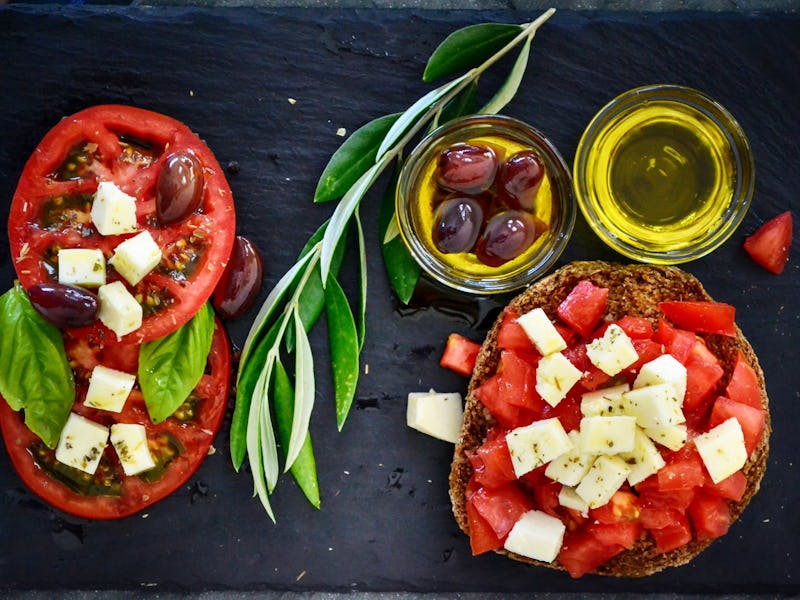Researchers Identify a Diet That Could Help Fight Depression
Spoiler: It's not the keto diet.

Depression affects 300 million people globally. While interventions like anti-depressants and exercise offer solutions on some levels, researchers are always in search of new avenues of attack. A recent review published in Molecular Psychiatry suggests that the Mediterranean diet, fresh off it’s recent public shaming, may actually be one of them.
Conducted by Camille Lassale Ph.D., a research associate at University College London’s Institute of Epidemiology and Public Health, the paper examines 41 studies on diets and depression, intending to take each study apart and analyze it component by component. Her results crown a champion diet that we already know to be relatively healthy. When it comes to depression, it’s diets that look the most like the Mediterranean diet that seem to significantly lower overall risk.
“Of the 41 studies in our review, four specifically looked at the link between a traditional Mediterranean diet and depression over time on 36,556 adults,” Lassale wrote in a Conversation article. “We found that people with a more Mediterranean-like diet had a 33 percent lower risk of developing depression than people whose diet least resembled a Mediterranean diet.”
At it's heart, the Mediterranean diet is really about variety, and availability of fresh ingredients
What foods “resemble a Mediterranean diet?” Some of the earliest landmark studies on the Mediterranean diet describe it as high in fruits and vegetables, poultry and fish, with very low levels of red meat and dairy. Descriptions of this diet also often include moderate red wine intake, although more recent research suggests drinking any amount of alcohol probably isn’t doing you any favors.
While Lassale’s study can’t prove that eating this way prevents depression, she notes that these foods do tend to have an element in common. Fruits, vegetables and nuts (which make up the majority of the Mediterranean diet) play a role in preventing inflammation in the brain, which some studies have linked to depression. Lassale’s study indicates that foods rich in antioxidants, like the ones in the Mediterranean diet, may provide some protection against this inflammation.
“A diet rich in anti-inflammatory and anti-oxidant components, commonly found in fruit, vegetables, nuts and wine (which should be drunk in moderation), can directly affect the brain by protecting it from oxidative stress and inflammation,” the study authors write.
Previous research suggests the power of anti-inflammatories is pretty effective, and some experts go so far as to say that this dietary advice should be incorporated into mental health treatments. However, this is not an easy fix. Even if this new research holds up in clinical trials, the Mediterranean diet tends to favor fresh foods over packaged ones, which can often be financially out of reach. For this reason, previous studies have shown that rich people tend to find it easier adhere to the Mediterranean diet.
But still, these interpretations all come back to an important fact: This is an aggregation of observational studies, and Lassale and the authors say this is just the beginning of their research on the possible mental health benefits of the Mediterranean diet. From a health perspective, it’s pretty hard to criticize a diet that embraces variety, especially in things like fruits and vegetables, when fad diets from the keto diet to the carnivore diet abound. In a sense, maybe this is a step in restoring dietary normalcy, with some important impacts on mental health as well.
You Might Also Like: